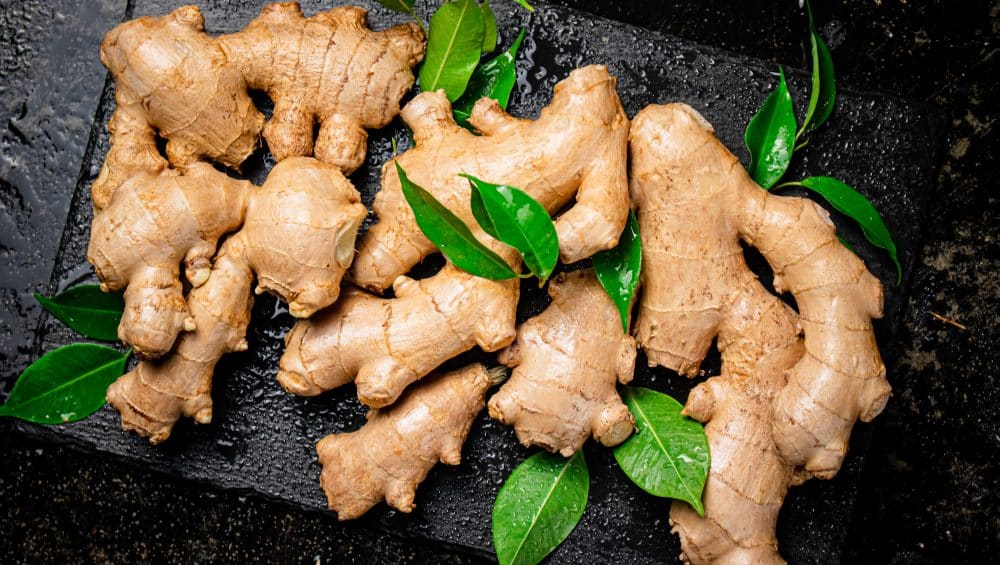Are you looking for a natural way to reduce inflammation and manage pain without the risks associated with medications? Ginger is an ancient herb that has been used in traditional medicine for centuries due to its powerful anti-inflammatory properties. It can help reduce inflammation associated with conditions such as osteoarthritis and rheumatoid arthritis.
It can also improve gut health, boost immunity, provide relief from cancer treatment symptoms, like nausea and vomiting, and even reduce blood pressure and cholesterol levels. In this article, we will explore how ginger can be easily incorporated into your diet. This way, you can start experiencing the benefits of this amazing herb today!
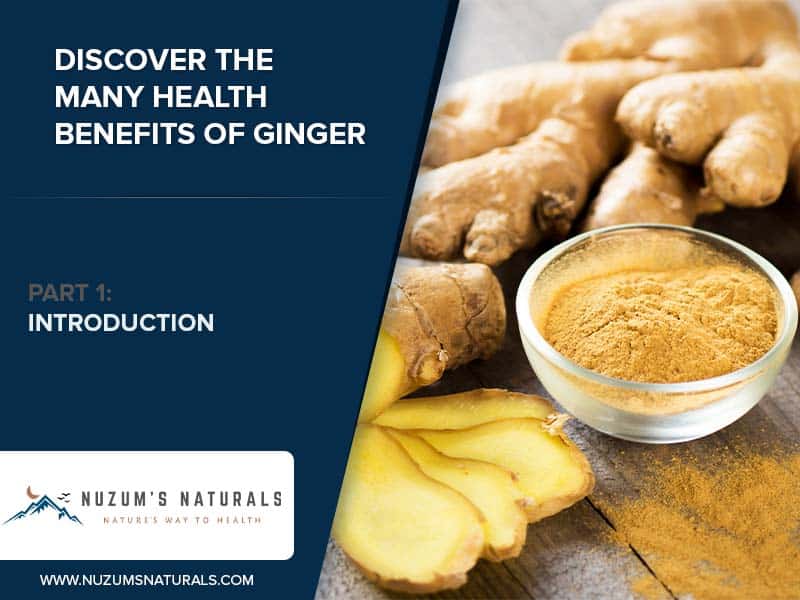
1Introduction
Ginger is a perennial herb that is native to tropical regions of Asia and is widely cultivated for its edible rhizome or underground stem. The rhizome is the part of the ginger plant that is used for both culinary and medicinal purposes, and it has a long history of use as a natural remedy for a variety of ailments. Ginger is mentioned in ancient Chinese, Indian, and Middle Eastern texts for its medicinal properties, and it was used in traditional medicine systems, such as Ayurveda and traditional Chinese medicine, for thousands of years. It has been traditionally used to treat a variety of conditions, including nausea, vomiting, indigestion, pain, and inflammation. Additionally, ginger has also been used as an aphrodisiac, a carminative, and a treatment for the common cold, influenza, and other respiratory infections.
The rhizome of the ginger plant contains a number of bioactive compounds, including gingerols, shogaols, and paradols, which have been found to have anti-inflammatory, antioxidant, and other medicinal properties. These compounds are responsible for many of the health benefits of ginger, which is why it is considered a potent natural remedy. With more research on ginger ongoing, there’s a possibility of finding more health benefits of ginger.
Ginger contains a number of bioactive compounds that contribute to its medicinal properties. The most well-known and well-studied compounds found in ginger are gingerols and shogaols. Gingerols are the most abundant compounds found in fresh ginger and are responsible for much of its pungency. They have anti-inflammatory, antioxidant, and analgesic properties, which means that they can help reduce pain and inflammation in the body as well as protect cells from damage caused by free radicals.
Shogaols, on the other hand, are formed when ginger is dried or cooked. They have a higher pungency than gingerols and have been found to have similar, but more potent, medicinal properties. Studies have found that shogaols have a greater ability to reduce inflammation and pain as well as inhibit the growth of cancer cells.
Ginger also contains a number of other compounds, such as paradols, zingerone, and gingerdione, that have not been as well studied as gingerols and shogaols but still have health benefits. Paradols are anti-inflammatory compounds that have also been found to have anti-cancer properties. Zingerone is a compound found in ginger that is also responsible for its flavor and aroma. It has been found to have anti-inflammatory and antioxidant properties, and gingerdione has been reported to have anti-inflammatory, antioxidant, and anti-cancer properties.

2Ginger For Reducing Inflammation
Inflammation is a natural response of the body to injury or infection. But when it becomes chronic, it can lead to the development of various chronic diseases, such as osteoarthritis, rheumatoid arthritis, and cardiovascular disease. Inflammation is also associated with various forms of cancer as well as conditions such as metabolic syndrome, which is a group of conditions that increase the risk of heart disease, stroke, and diabetes.
Ginger contains a number of anti-inflammatory compounds, including gingerols and shogaols. These compounds have been found to inhibit the production of pro-inflammatory molecules and reduce inflammation in the body. Studies have shown that gingerols and shogaols can effectively reduce pain and inflammation in conditions such as osteoarthritis and rheumatoid arthritis.
Numerous studies have been conducted on the anti-inflammatory effects of ginger, particularly in relation to osteoarthritis and rheumatoid arthritis. The results of these studies have been promising, with ginger shown to effectively reduce pain and inflammation in patients with these conditions. Additionally, ginger has been found to be just as effective as non-steroidal anti-inflammatory drugs (NSAIDs) in reducing pain and inflammation in some cases, with the added benefit of having fewer side effects.
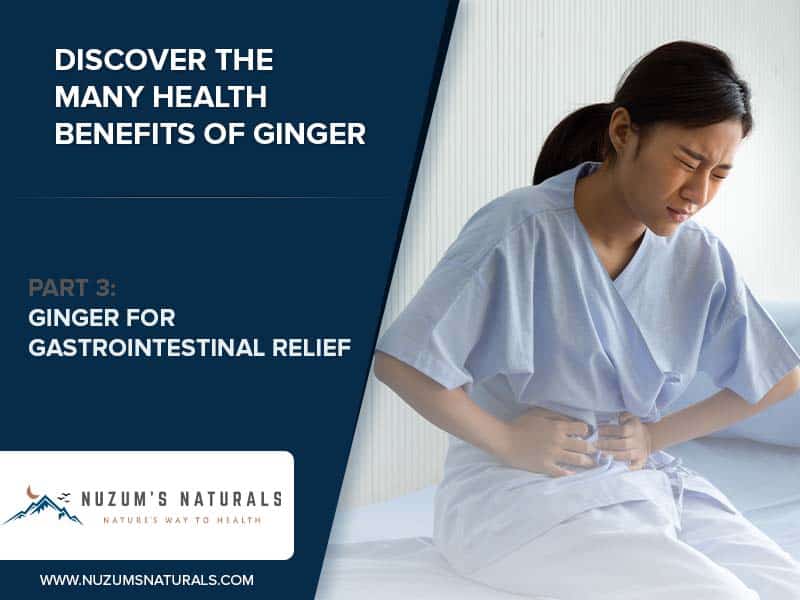
3Ginger For Gastrointestinal Relief
Ginger has been traditionally used as a digestive aid and has been found to be effective in reducing symptoms of nausea, vomiting, and indigestion. It can help alleviate morning sickness, motion sickness, as well as nausea caused by chemotherapy. Ginger may also help stimulate the production of bile, which can aid in the digestion of fats. Furthermore, ginger has been found to have an antispasmodic effect on the smooth muscles of the gastrointestinal tract, which may help alleviate symptoms of indigestion and bloating.
Ginger has been found to have a positive impact on gut health, including gut motility and the gut microbiome. Studies have shown that ginger can help improve gut motility, which can prevent constipation and diarrhea. Additionally, ginger has been found to have a beneficial effect on the gut microbiome, which is the collection of microorganisms that live in the gut. It has been found to promote the growth of beneficial bacteria and inhibit the growth of harmful bacteria.
Ginger has been found to have a number of potential benefits as a complementary treatment for gastrointestinal disorders. It has been found to be effective in reducing symptoms of nausea, vomiting, indigestion, and bloating. Additionally, ginger has been found to be beneficial in the management of inflammatory bowel disease (IBD), such as Crohn’s disease and ulcerative colitis. Furthermore, ginger has been found to be effective in preventing and treating gastric ulcers, which are painful sores that can develop in the stomach lining. Overall, ginger may be a beneficial complementary treatment for those with gastrointestinal disorders due to its anti-inflammatory and gut-soothing properties.
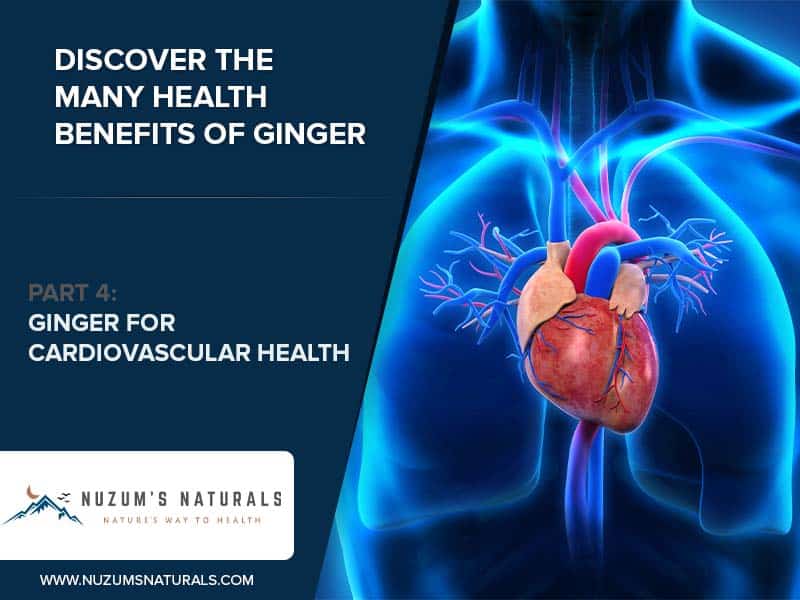
4Ginger For Cardiovascular Health
Ginger has been found to have a number of potential benefits for heart health, including its ability to lower blood pressure and cholesterol levels. Studies have shown that ginger can lower systolic blood pressure by as much as 11% and diastolic blood pressure by seven percent. Additionally, ginger has been found to lower total cholesterol levels by as much as 12% and LDL cholesterol levels by as much as 23%. The reduction of cholesterol and blood pressure can prevent the development of heart disease, stroke, and other cardiovascular-related diseases.
Ginger has antioxidant and anti-inflammatory properties that can benefit the cardiovascular system. The antioxidant properties of ginger can help protect the cardiovascular system by preventing damage caused by free radicals, which can lead to the development of cardiovascular disease. Additionally, the anti-inflammatory properties of ginger can help reduce inflammation in the cardiovascular system, which is a major risk factor for the development of cardiovascular disease.
Ginger has been found to have a beneficial effect on preventing blood clots and platelet aggregation. Studies have shown that ginger can inhibit the formation of blood clots, which can lead to the development of heart attacks and strokes. Additionally, ginger has been found to inhibit platelet aggregation, which is the clumping together of platelets, which can lead to the formation of blood clots. The inhibition of blood clots and platelet aggregation can prevent the occurrence of heart attacks and strokes. Overall, ginger may be beneficial in promoting cardiovascular health by reducing inflammation, oxidation, blood pressure, and cholesterol levels while preventing blood clots and platelet aggregation.
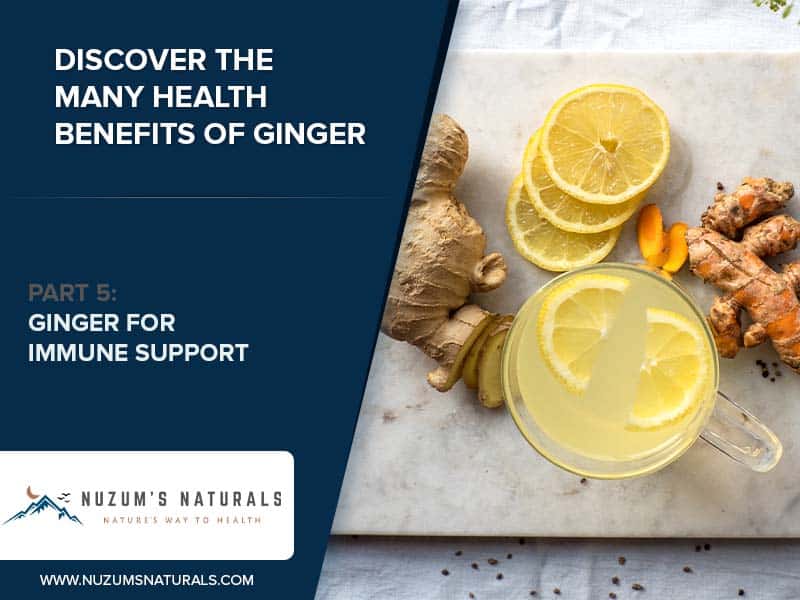
5Ginger For Immune Support
Ginger has been found to have immune-boosting properties, including its ability to increase the production of white blood cells. White blood cells, also known as leukocytes, play an important role in the immune system by fighting off infection and disease. Studies have shown that ginger can increase the production of white blood cells, which can help boost the immune system and improve resistance to infection.
Ginger has been found to have a beneficial effect on various markers of immunity and infection. Studies have shown that ginger can increase the production of interferon, which is a protein that helps fight off viral infections. Additionally, ginger has been found to increase the production of tumor necrosis factor (TNF), which is a protein that helps fight off bacterial and fungal infections. Furthermore, ginger has been found to increase the production of interleukin-2, which is a protein that helps stimulate the immune system.
Ginger has been found to have a number of potential benefits as a complementary treatment for preventing and treating infections. It has been found to be effective in reducing symptoms of the common cold and influenza. Additionally, ginger has been found to be beneficial in the treatment of respiratory infections, such as bronchitis and pneumonia. Furthermore, ginger has been found to be effective in the prevention and treatment of urinary tract infections. Overall, ginger may be beneficial as a complementary treatment for preventing and treating infections due to its immune-boosting properties.

6Ginger For Pain Management
Ginger has been traditionally used as a pain reliever and has been found to be effective in reducing pain in a variety of conditions, such as menstrual cramps, headaches, and muscle soreness. It can help alleviate menstrual cramps by reducing inflammation and increasing blood flow to the uterus. Additionally, ginger can help alleviate headaches by reducing inflammation and tension in the head and neck. Ginger can also help alleviate muscle soreness by reducing inflammation and promoting blood flow to the muscles.
Ginger has anti-inflammatory and antioxidant properties that can contribute to its pain-relieving effects. Its anti-inflammatory properties can help reduce pain and inflammation in the body, while its antioxidant properties can help protect cells from damage caused by free radicals. This can help alleviate pain and discomfort caused by conditions such as menstrual cramps, headaches, and muscle soreness.
Ginger has been found to have the potential as a complementary treatment for chronic pain, specifically as an alternative or adjunctive treatment to painkillers. Studies have shown that ginger can be just as effective as non-steroidal anti-inflammatory drugs (NSAIDs) in reducing pain and inflammation in some cases, with the added benefit of having fewer side effects. Additionally, ginger may also be a safer alternative for patients who cannot take over-the-counter pain relievers or prescription pain medications due to contraindications. As such, ginger may be a useful addition to the pain management plan for those with chronic pain conditions.
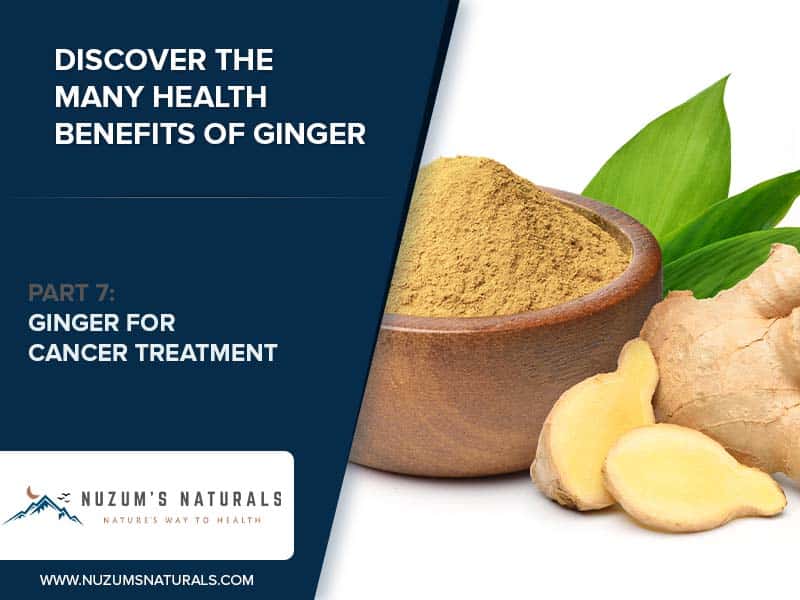
7Ginger For Cancer Treatment
Recent research has begun to investigate the potential of ginger as an adjuvant cancer treatment. Adjuvant therapy is a treatment given after the primary treatment, such as surgery or chemotherapy, to increase the chance of a cure and reduce the risk of cancer returning. Some laboratory and animal studies have shown that ginger compounds have anti-tumor properties, such as reducing the growth and spread of cancer cells, and some human studies have also suggested that ginger may have potential as an adjuvant cancer therapy.
Ginger has been found to be effective in reducing symptoms related to cancer treatment, such as nausea, vomiting, and loss of appetite. This is particularly beneficial for cancer patients who undergo chemotherapy and radiation therapy, as these treatments can cause severe side effects, such as nausea and vomiting. Additionally, ginger may also be beneficial in reducing loss of appetite, which is a common problem among cancer patients.
It’s important to note that ginger should not be used as a substitute for standard cancer treatments and should only be used under the guidance of a healthcare professional, especially for cancer patients. High doses of ginger can have blood-thinning effects, which can be dangerous for those taking blood-thinning medications or who have bleeding disorders. Additionally, ginger may interact with certain medications, such as blood pressure medications, blood sugar medications, and blood thinning medications, so it’s important to check with the healthcare professional before using ginger as an adjuvant cancer treatment. Overall, ginger may have the potential as an adjuvant cancer treatment, but more research is needed, and it should be used with caution under medical supervision.
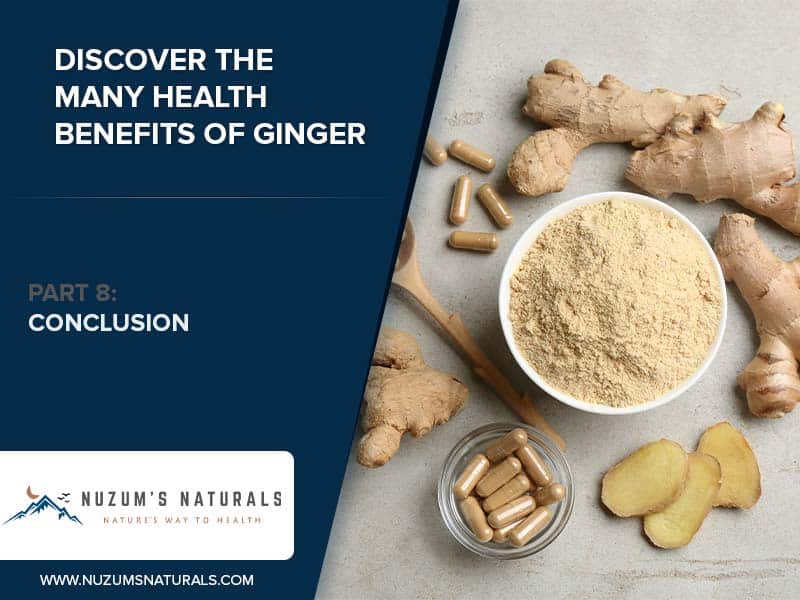
8Conclusion
Ginger is a well-known herb that has been used for centuries in traditional medicine for its medicinal properties. It contains a variety of bioactive compounds, including gingerols and shogaols, which have anti-inflammatory, antioxidant, and pain-relieving properties. Research has shown that ginger can be beneficial for reducing inflammation, particularly in conditions such as osteoarthritis and rheumatoid arthritis; it also has benefits for gastrointestinal issues, such as nausea, vomiting, and indigestion, and can help improve gut health and motility. Additionally, ginger has been found to have potential benefits for heart health, including reducing blood pressure and cholesterol levels and preventing blood clots and platelet aggregation. It also may help with boosting the immune system, reducing symptoms related to cancer treatment, and providing pain relief.
Ginger can be easily incorporated into a healthy lifestyle and diet. Fresh ginger root can be grated or minced and added to dishes, such as stir-fries, soups, and marinades. Dried ginger powder can be used to make tea or added to smoothies, baked goods, and spice blends. Ginger supplements are also available in the form of capsules, tablets, and extracts. It’s important to note that taking ginger supplements should be done under the guidance of a healthcare professional, and consuming ginger in excessive amounts may cause side effects.

